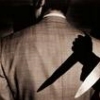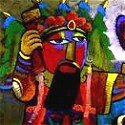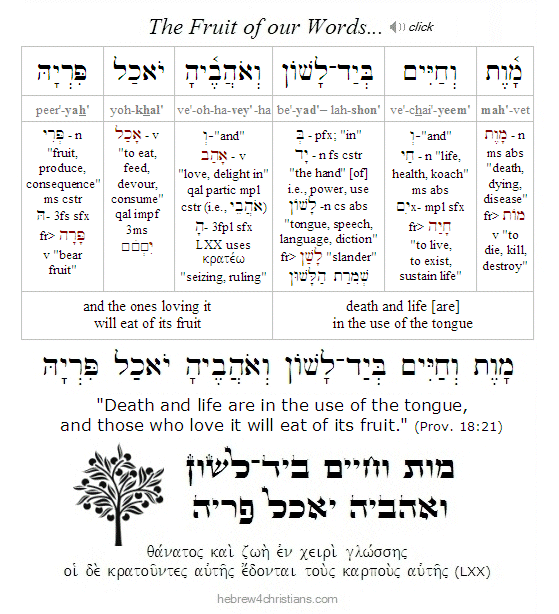|
As already mentioned in the Torah studies for Tazria and Metzora, the sages link tzaraat (i.e., spiritual affliction that affects the flesh) with lashon hara (לָשׁוֹן הָרָה), which is defined as saying something bad about another person even if it happens to be true. The sages regard this sin as particularly offensive: "Lashon Hara is worse than murder. One who murders, murders but one; however, one who speaks lashon hara kills three: the one who speaks it (motzi shem ra), the one who hears it, and the one of whom it is spoken." This is similar to the sin of "emotional homicide" caused by publicly shaming another. According to the Talmud, the shamed person's face is drained of blood and turns white, and therefore humiliation is called halbanat panim, "whitening the face."
The tongue is likened to an arrow. If a man were to draw his sword to kill his fellow man, but the victim pleads for his life, the would-be murderer can relent and return his sword to the sheath. But the arrow, when shot toward its mark, cannot be returned... So abusive language can be a weapon used to kill the soul (Prov. 18:21).
Some people try to excuse the sin of lashon hara by claiming that they merely said something -- but they didn't do anything. To reveal the connection between saying and doing, the Torah commands that the metzora be brought before the Kohen who determines his fate with a single word: "clean" or "unclean." This is intended to teach that "death and life are in the hand of the tongue" (מָוֶת וְחַיִּים בְּיַד־לָשׁוֹן). The tongue is said to "have a hand" that can wield a weapon just as effectively as the hand on your arm. Yeshua likewise warned us by saying that "every careless word" we utter will eventually be brought to the bar of eternal examination (Matt. 12:36).

What's behind the sin of lashon hara? What inspires its practice? What's its secret motive? It is not a heart attitude that objectifies others? That regards them as potential threats or dehumanizes them as a means to engage in fatuous self-elevation? Is not lashon hara ultimately a matter of haughtiness (יְהִירוּת), of spiritual pride, and an overweening sense of self-importance?
R' Naftali of Barshad said, "In the World to Come, I will be able to find all kinds of excuses for my offenses in this world, except the sin of haughtiness.
When the heavenly court asks me, "Did you learn Torah?" I will reply: "Unfortunately, I was ignorant and I did not know how to learn." When they ask me, "Did you at least serve Hashem with fasting and abstinence?" I will reply: "I was weak and could not endure." When they ask, "Did you at least give lots of tzedakah?" I will reply, "Unfortunately I was poor and destitute."
"If that is the case," they will then ask, "and you were ignorant, weak, and poor, then why were you haughty?"
To that question, I have no reply.... (Iturei Torah)
As Rabbi Yitzchak of Berditchev (the "Berditchever") once wrote, "Were the issue of haughtiness and arrogance not written about in so many holy scriptures, it would be impossible to believe that a person made of dust and ashes, so flimsy, so fragile, alive today, dead tomorrow - can be haughty!"
Recall the story of the Syrian general Naaman and his healing of tzaraat through the ministry of the prophet Elisha (2 Kings. 5:1-14). By refusing to personally meet with the great general, Elisha was teaching the way of humility (עֲנָוָה). Naaman expected a spectacular "outward show," complete with pomp and circumstance to attend his healing, but he was disappointed to learn that what was required of him was a humble act of obedience... His sevenfold tevillah -- the complete immersion in water -- forced the general to be striped of his outer trappings of power and social prestige. In that regard, Naaman's healing pointed to the same heart change required of the metzora from the camps of Israel. Naaman's tevillah represented a sort of rebirth from the womb, and he emerged from the waters a changed and humbler man.
Within the camp of Israel, the purification process of the metzora was intended to teach the value of humility. The required elements are "chok" - and therefore bypass the pride of human reason. The twig of the mighty cedar symbolizes pride; the crimson dye comes from the lowly worm; the hyssop grows close to the earth. The two birds represent the two uses of the tongue. The sacrificed bird represents the chattering and chirping of mindless speech, whereas the bird released to heaven symbolizes the right use of language -- as a means of expressing praise and gratitude to God for the gift of life... "Since the plagues come from evil talk, which is the act of babbling words, consequently birds were required for his purification which babble continually with chirping sounds" (Rashi).
Note: It's important to understand that one is forbidden to speak lashon hara not only about others, but also about yourself! Engaging in self-abuse is also a species of lashon hara. Overbearing self-condemnation is a form of false humility. Shame and pride are poles of the same rotten continuum. Self-respect runs full-circle in these matters. If you shower contempt on yourself, it is likely others will eventually become the targets of your self-abuse....
Postscript: The prohibition against speaking lashon hara does not imply that we are excused from making righteous judgments (John 7:24). Sometimes it is the mark of a coward to refrain from speaking the truth. As Albert Einstein once said, "The world is a dangerous place, not because of those who do evil, but because of those who look on and do nothing." We must "speak the truth in love," even if that means sometimes offending those who wish to excuse or overlook evil behavior...
Hebrew Lesson
Prov. 18:21 reading (click):
|




